Exploiting National and Regional Differences: MNCs & State Responses
VerifiedAdded on 2023/04/17
|16
|3718
|487
Report
AI Summary
This report examines how multinational corporations (MNCs) exploit national and regional differences in culture and regulation, and how states respond to these strategies. It analyzes how different host countries offer location advantages for various types of inward investment, considering the impact of different forms of regulation. The report also discusses the extent to which MNCs seek international uniformity versus adapting organizational policies to specific host countries. Furthermore, it evaluates whether states should prioritize maximizing foreign direct investment (FDI) or pursue alternative strategies. The analysis reveals that companies facing strict labor and environmental regulations may relocate to more business-friendly nations, and that tax laws and regulations significantly influence multinational companies' FDI decisions. This document is a valuable resource for understanding the complex interplay between MNCs, national policies, and global business strategies. Desklib provides a platform for students to access similar solved assignments and past papers.
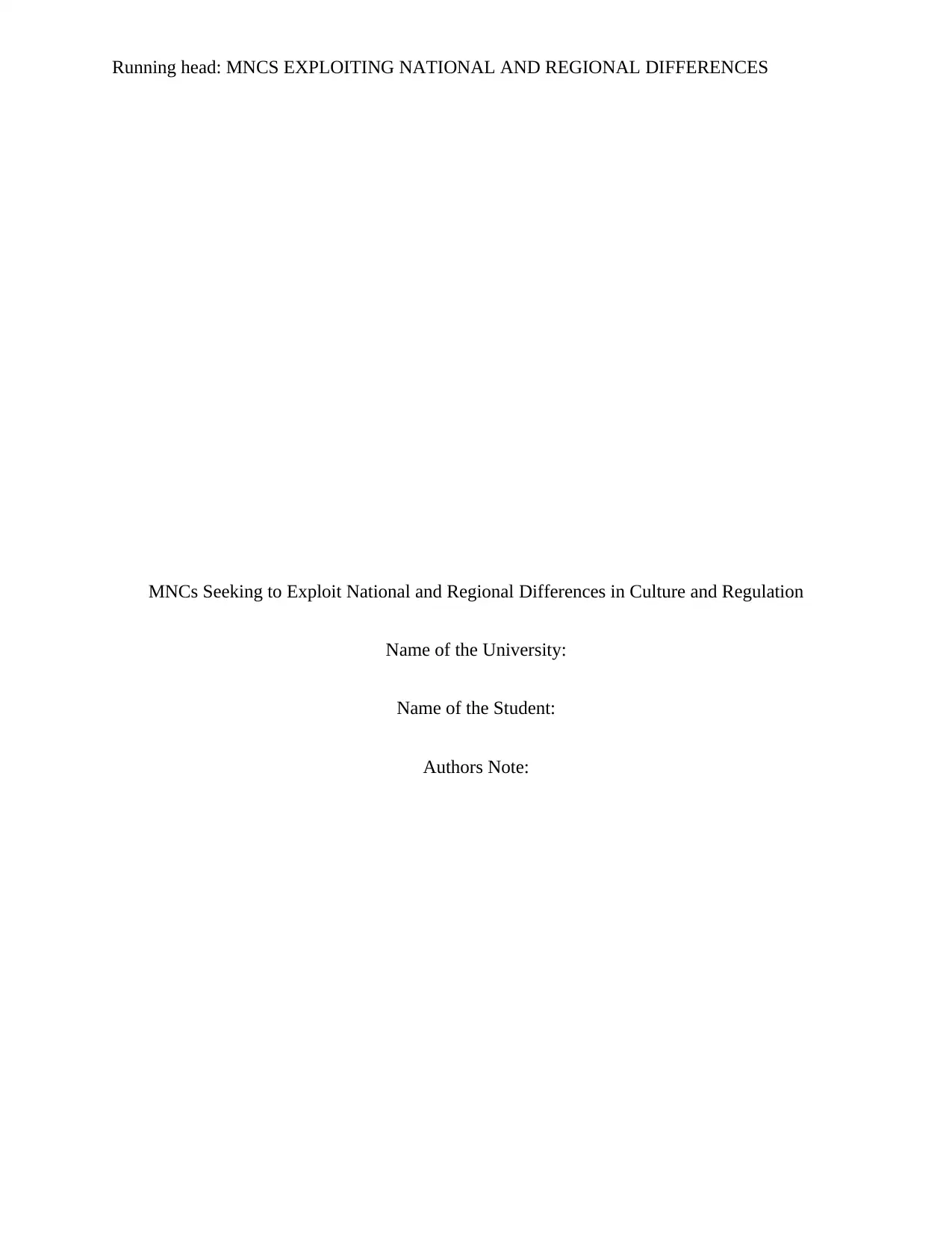
Running head: MNCS EXPLOITING NATIONAL AND REGIONAL DIFFERENCES
MNCs Seeking to Exploit National and Regional Differences in Culture and Regulation
Name of the University:
Name of the Student:
Authors Note:
MNCs Seeking to Exploit National and Regional Differences in Culture and Regulation
Name of the University:
Name of the Student:
Authors Note:
Paraphrase This Document
Need a fresh take? Get an instant paraphrase of this document with our AI Paraphraser
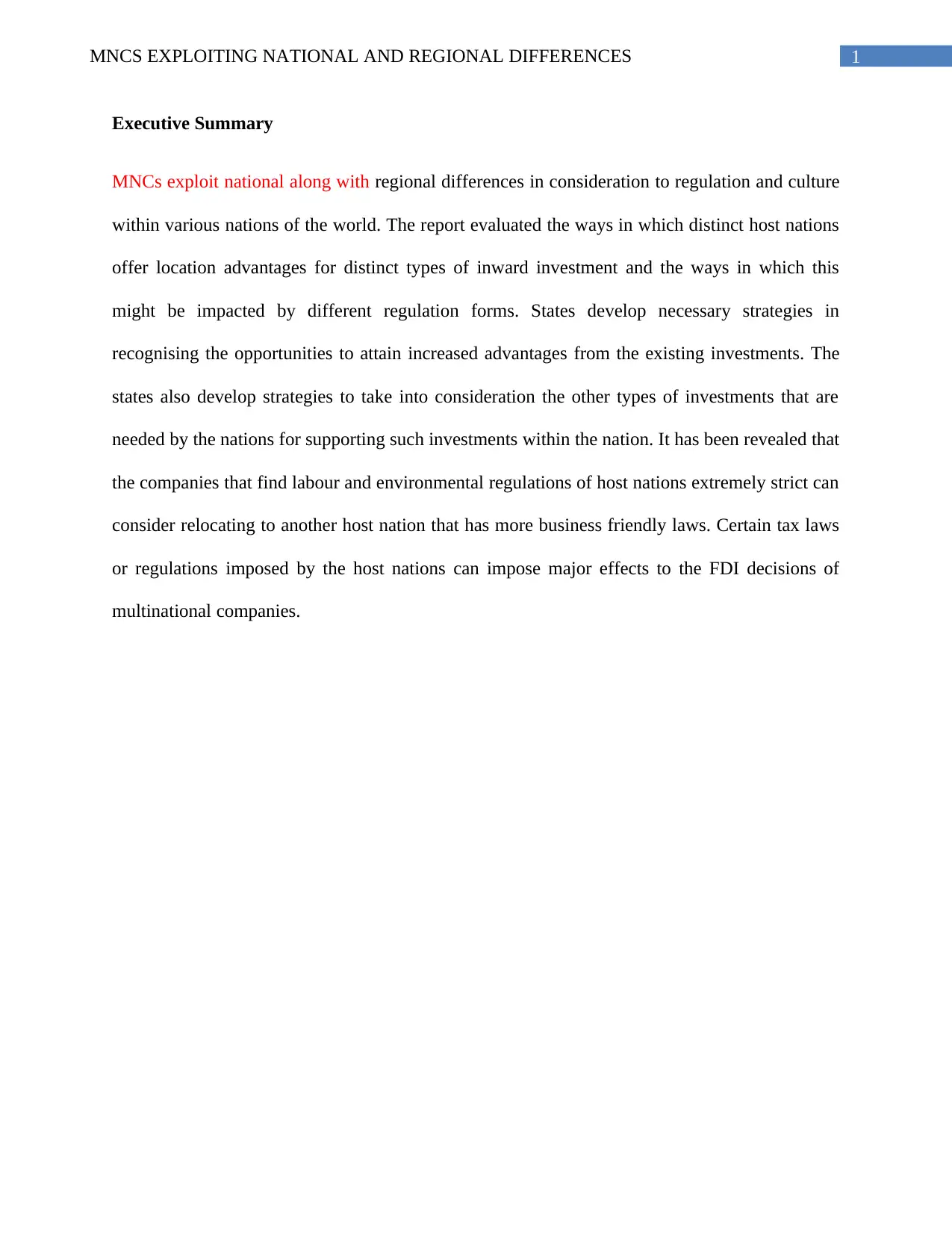
1MNCS EXPLOITING NATIONAL AND REGIONAL DIFFERENCES
Executive Summary
MNCs exploit national along with regional differences in consideration to regulation and culture
within various nations of the world. The report evaluated the ways in which distinct host nations
offer location advantages for distinct types of inward investment and the ways in which this
might be impacted by different regulation forms. States develop necessary strategies in
recognising the opportunities to attain increased advantages from the existing investments. The
states also develop strategies to take into consideration the other types of investments that are
needed by the nations for supporting such investments within the nation. It has been revealed that
the companies that find labour and environmental regulations of host nations extremely strict can
consider relocating to another host nation that has more business friendly laws. Certain tax laws
or regulations imposed by the host nations can impose major effects to the FDI decisions of
multinational companies.
Executive Summary
MNCs exploit national along with regional differences in consideration to regulation and culture
within various nations of the world. The report evaluated the ways in which distinct host nations
offer location advantages for distinct types of inward investment and the ways in which this
might be impacted by different regulation forms. States develop necessary strategies in
recognising the opportunities to attain increased advantages from the existing investments. The
states also develop strategies to take into consideration the other types of investments that are
needed by the nations for supporting such investments within the nation. It has been revealed that
the companies that find labour and environmental regulations of host nations extremely strict can
consider relocating to another host nation that has more business friendly laws. Certain tax laws
or regulations imposed by the host nations can impose major effects to the FDI decisions of
multinational companies.
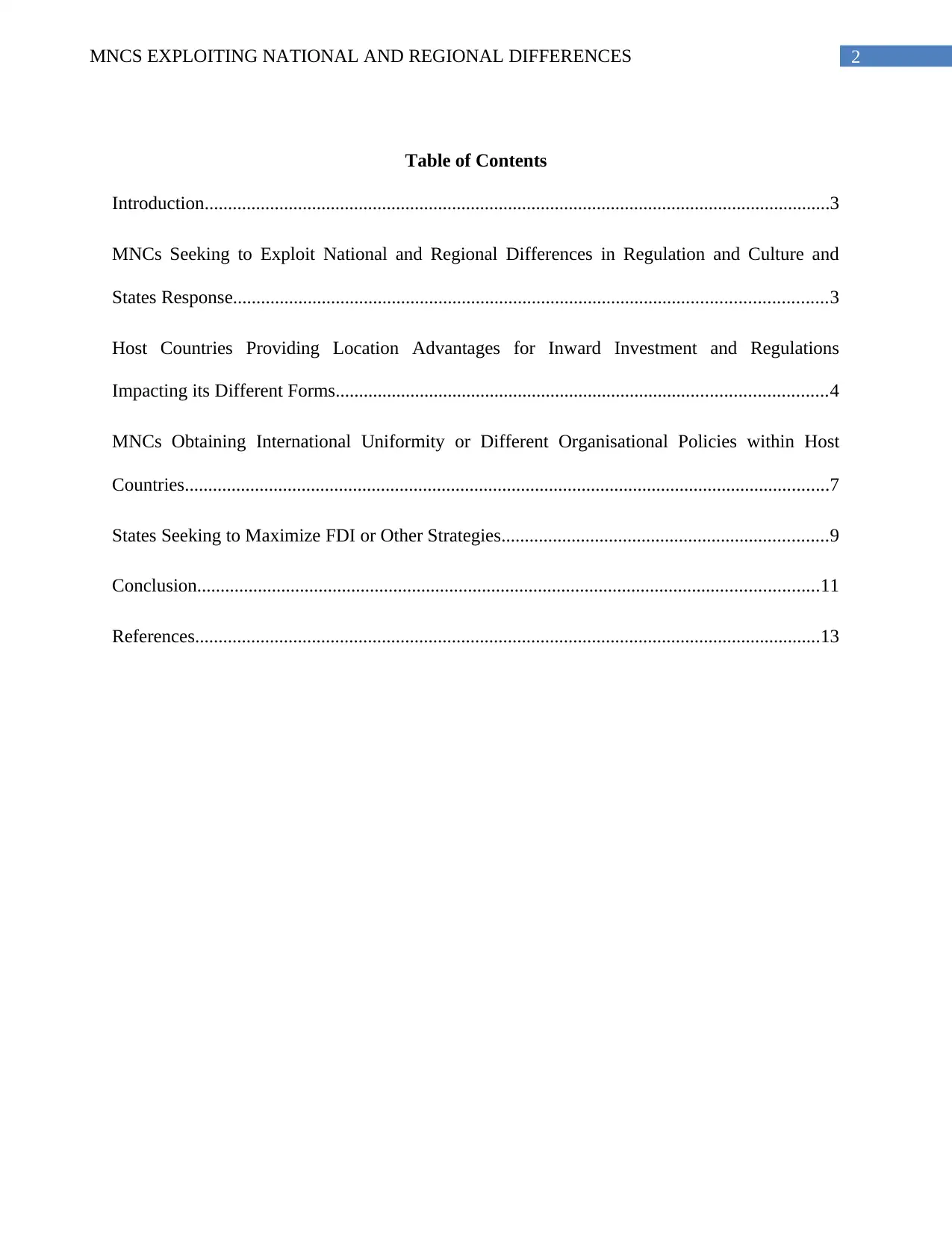
2MNCS EXPLOITING NATIONAL AND REGIONAL DIFFERENCES
Table of Contents
Introduction......................................................................................................................................3
MNCs Seeking to Exploit National and Regional Differences in Regulation and Culture and
States Response...............................................................................................................................3
Host Countries Providing Location Advantages for Inward Investment and Regulations
Impacting its Different Forms.........................................................................................................4
MNCs Obtaining International Uniformity or Different Organisational Policies within Host
Countries..........................................................................................................................................7
States Seeking to Maximize FDI or Other Strategies......................................................................9
Conclusion.....................................................................................................................................11
References......................................................................................................................................13
Table of Contents
Introduction......................................................................................................................................3
MNCs Seeking to Exploit National and Regional Differences in Regulation and Culture and
States Response...............................................................................................................................3
Host Countries Providing Location Advantages for Inward Investment and Regulations
Impacting its Different Forms.........................................................................................................4
MNCs Obtaining International Uniformity or Different Organisational Policies within Host
Countries..........................................................................................................................................7
States Seeking to Maximize FDI or Other Strategies......................................................................9
Conclusion.....................................................................................................................................11
References......................................................................................................................................13
⊘ This is a preview!⊘
Do you want full access?
Subscribe today to unlock all pages.

Trusted by 1+ million students worldwide
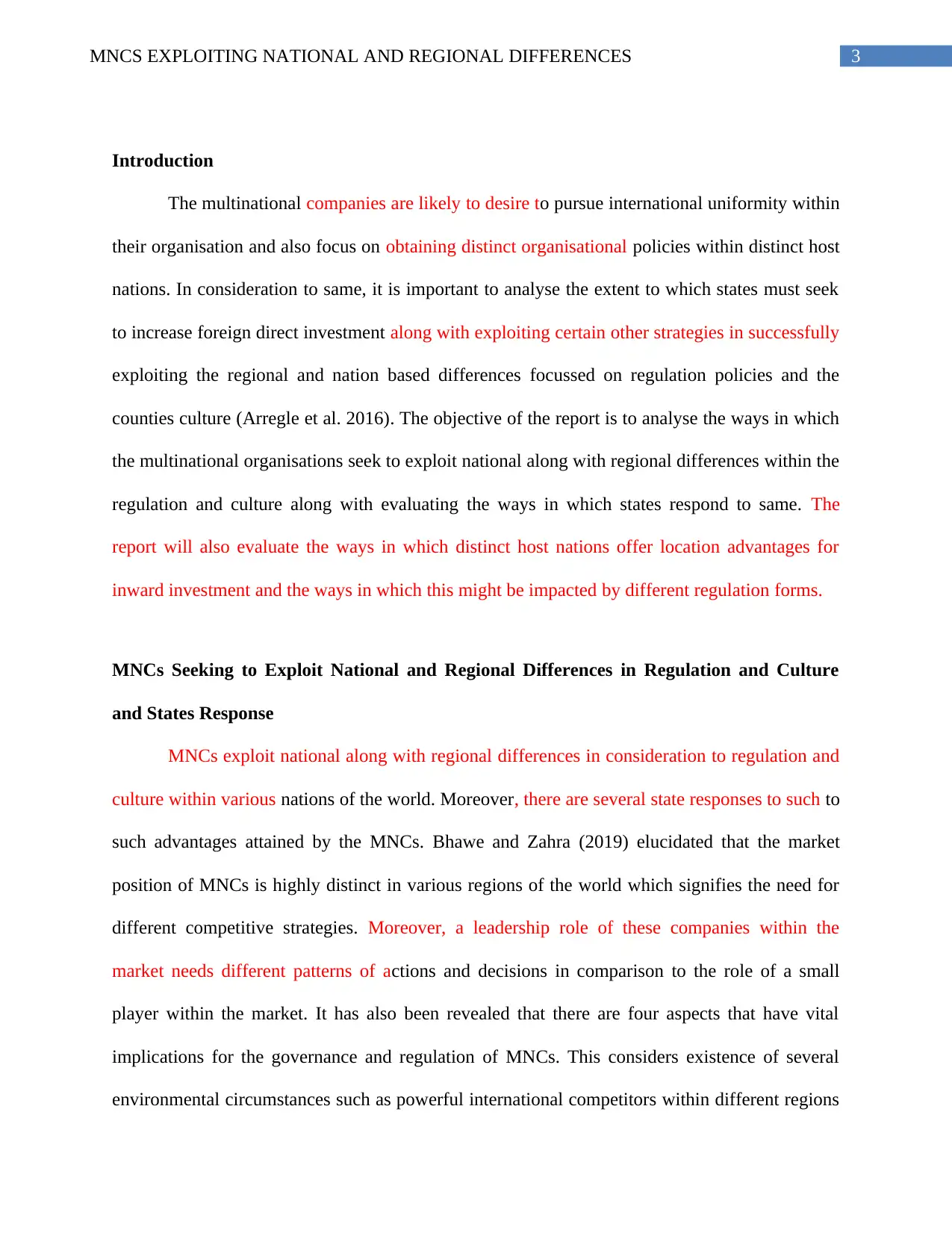
3MNCS EXPLOITING NATIONAL AND REGIONAL DIFFERENCES
Introduction
The multinational companies are likely to desire to pursue international uniformity within
their organisation and also focus on obtaining distinct organisational policies within distinct host
nations. In consideration to same, it is important to analyse the extent to which states must seek
to increase foreign direct investment along with exploiting certain other strategies in successfully
exploiting the regional and nation based differences focussed on regulation policies and the
counties culture (Arregle et al. 2016). The objective of the report is to analyse the ways in which
the multinational organisations seek to exploit national along with regional differences within the
regulation and culture along with evaluating the ways in which states respond to same. The
report will also evaluate the ways in which distinct host nations offer location advantages for
inward investment and the ways in which this might be impacted by different regulation forms.
MNCs Seeking to Exploit National and Regional Differences in Regulation and Culture
and States Response
MNCs exploit national along with regional differences in consideration to regulation and
culture within various nations of the world. Moreover, there are several state responses to such to
such advantages attained by the MNCs. Bhawe and Zahra (2019) elucidated that the market
position of MNCs is highly distinct in various regions of the world which signifies the need for
different competitive strategies. Moreover, a leadership role of these companies within the
market needs different patterns of actions and decisions in comparison to the role of a small
player within the market. It has also been revealed that there are four aspects that have vital
implications for the governance and regulation of MNCs. This considers existence of several
environmental circumstances such as powerful international competitors within different regions
Introduction
The multinational companies are likely to desire to pursue international uniformity within
their organisation and also focus on obtaining distinct organisational policies within distinct host
nations. In consideration to same, it is important to analyse the extent to which states must seek
to increase foreign direct investment along with exploiting certain other strategies in successfully
exploiting the regional and nation based differences focussed on regulation policies and the
counties culture (Arregle et al. 2016). The objective of the report is to analyse the ways in which
the multinational organisations seek to exploit national along with regional differences within the
regulation and culture along with evaluating the ways in which states respond to same. The
report will also evaluate the ways in which distinct host nations offer location advantages for
inward investment and the ways in which this might be impacted by different regulation forms.
MNCs Seeking to Exploit National and Regional Differences in Regulation and Culture
and States Response
MNCs exploit national along with regional differences in consideration to regulation and
culture within various nations of the world. Moreover, there are several state responses to such to
such advantages attained by the MNCs. Bhawe and Zahra (2019) elucidated that the market
position of MNCs is highly distinct in various regions of the world which signifies the need for
different competitive strategies. Moreover, a leadership role of these companies within the
market needs different patterns of actions and decisions in comparison to the role of a small
player within the market. It has also been revealed that there are four aspects that have vital
implications for the governance and regulation of MNCs. This considers existence of several
environmental circumstances such as powerful international competitors within different regions
Paraphrase This Document
Need a fresh take? Get an instant paraphrase of this document with our AI Paraphraser
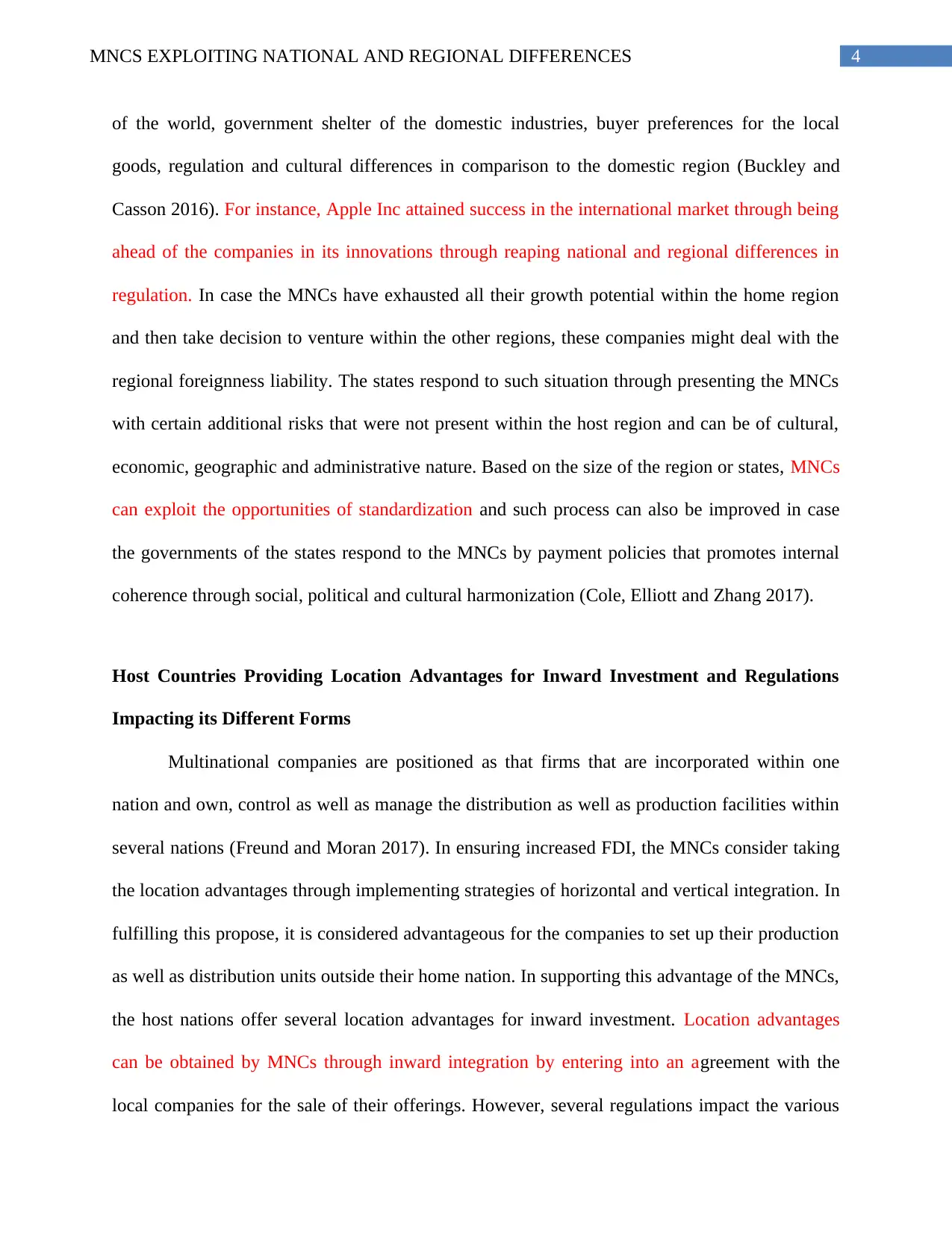
4MNCS EXPLOITING NATIONAL AND REGIONAL DIFFERENCES
of the world, government shelter of the domestic industries, buyer preferences for the local
goods, regulation and cultural differences in comparison to the domestic region (Buckley and
Casson 2016). For instance, Apple Inc attained success in the international market through being
ahead of the companies in its innovations through reaping national and regional differences in
regulation. In case the MNCs have exhausted all their growth potential within the home region
and then take decision to venture within the other regions, these companies might deal with the
regional foreignness liability. The states respond to such situation through presenting the MNCs
with certain additional risks that were not present within the host region and can be of cultural,
economic, geographic and administrative nature. Based on the size of the region or states, MNCs
can exploit the opportunities of standardization and such process can also be improved in case
the governments of the states respond to the MNCs by payment policies that promotes internal
coherence through social, political and cultural harmonization (Cole, Elliott and Zhang 2017).
Host Countries Providing Location Advantages for Inward Investment and Regulations
Impacting its Different Forms
Multinational companies are positioned as that firms that are incorporated within one
nation and own, control as well as manage the distribution as well as production facilities within
several nations (Freund and Moran 2017). In ensuring increased FDI, the MNCs consider taking
the location advantages through implementing strategies of horizontal and vertical integration. In
fulfilling this propose, it is considered advantageous for the companies to set up their production
as well as distribution units outside their home nation. In supporting this advantage of the MNCs,
the host nations offer several location advantages for inward investment. Location advantages
can be obtained by MNCs through inward integration by entering into an agreement with the
local companies for the sale of their offerings. However, several regulations impact the various
of the world, government shelter of the domestic industries, buyer preferences for the local
goods, regulation and cultural differences in comparison to the domestic region (Buckley and
Casson 2016). For instance, Apple Inc attained success in the international market through being
ahead of the companies in its innovations through reaping national and regional differences in
regulation. In case the MNCs have exhausted all their growth potential within the home region
and then take decision to venture within the other regions, these companies might deal with the
regional foreignness liability. The states respond to such situation through presenting the MNCs
with certain additional risks that were not present within the host region and can be of cultural,
economic, geographic and administrative nature. Based on the size of the region or states, MNCs
can exploit the opportunities of standardization and such process can also be improved in case
the governments of the states respond to the MNCs by payment policies that promotes internal
coherence through social, political and cultural harmonization (Cole, Elliott and Zhang 2017).
Host Countries Providing Location Advantages for Inward Investment and Regulations
Impacting its Different Forms
Multinational companies are positioned as that firms that are incorporated within one
nation and own, control as well as manage the distribution as well as production facilities within
several nations (Freund and Moran 2017). In ensuring increased FDI, the MNCs consider taking
the location advantages through implementing strategies of horizontal and vertical integration. In
fulfilling this propose, it is considered advantageous for the companies to set up their production
as well as distribution units outside their home nation. In supporting this advantage of the MNCs,
the host nations offer several location advantages for inward investment. Location advantages
can be obtained by MNCs through inward integration by entering into an agreement with the
local companies for the sale of their offerings. However, several regulations impact the various
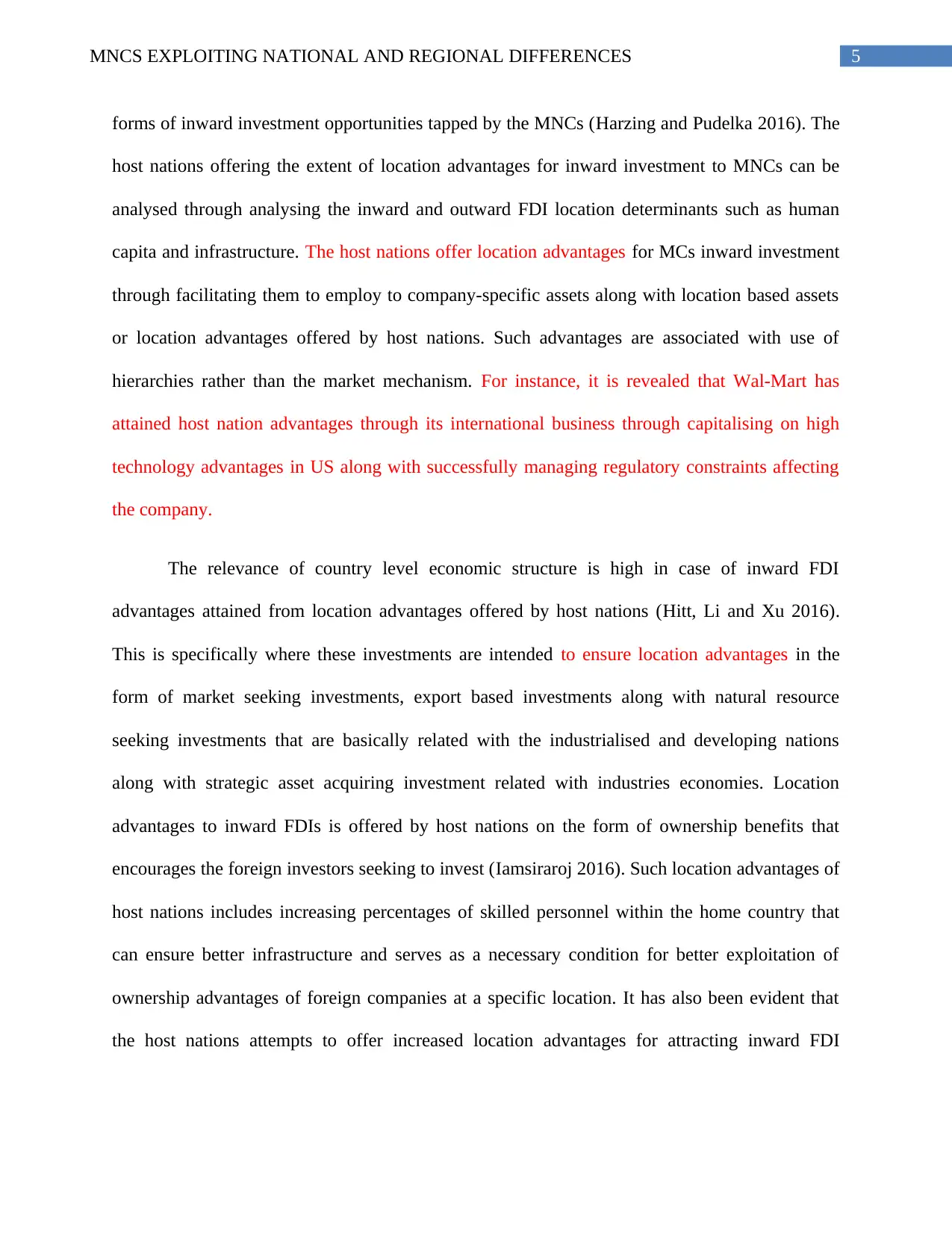
5MNCS EXPLOITING NATIONAL AND REGIONAL DIFFERENCES
forms of inward investment opportunities tapped by the MNCs (Harzing and Pudelka 2016). The
host nations offering the extent of location advantages for inward investment to MNCs can be
analysed through analysing the inward and outward FDI location determinants such as human
capita and infrastructure. The host nations offer location advantages for MCs inward investment
through facilitating them to employ to company-specific assets along with location based assets
or location advantages offered by host nations. Such advantages are associated with use of
hierarchies rather than the market mechanism. For instance, it is revealed that Wal-Mart has
attained host nation advantages through its international business through capitalising on high
technology advantages in US along with successfully managing regulatory constraints affecting
the company.
The relevance of country level economic structure is high in case of inward FDI
advantages attained from location advantages offered by host nations (Hitt, Li and Xu 2016).
This is specifically where these investments are intended to ensure location advantages in the
form of market seeking investments, export based investments along with natural resource
seeking investments that are basically related with the industrialised and developing nations
along with strategic asset acquiring investment related with industries economies. Location
advantages to inward FDIs is offered by host nations on the form of ownership benefits that
encourages the foreign investors seeking to invest (Iamsiraroj 2016). Such location advantages of
host nations includes increasing percentages of skilled personnel within the home country that
can ensure better infrastructure and serves as a necessary condition for better exploitation of
ownership advantages of foreign companies at a specific location. It has also been evident that
the host nations attempts to offer increased location advantages for attracting inward FDI
forms of inward investment opportunities tapped by the MNCs (Harzing and Pudelka 2016). The
host nations offering the extent of location advantages for inward investment to MNCs can be
analysed through analysing the inward and outward FDI location determinants such as human
capita and infrastructure. The host nations offer location advantages for MCs inward investment
through facilitating them to employ to company-specific assets along with location based assets
or location advantages offered by host nations. Such advantages are associated with use of
hierarchies rather than the market mechanism. For instance, it is revealed that Wal-Mart has
attained host nation advantages through its international business through capitalising on high
technology advantages in US along with successfully managing regulatory constraints affecting
the company.
The relevance of country level economic structure is high in case of inward FDI
advantages attained from location advantages offered by host nations (Hitt, Li and Xu 2016).
This is specifically where these investments are intended to ensure location advantages in the
form of market seeking investments, export based investments along with natural resource
seeking investments that are basically related with the industrialised and developing nations
along with strategic asset acquiring investment related with industries economies. Location
advantages to inward FDIs is offered by host nations on the form of ownership benefits that
encourages the foreign investors seeking to invest (Iamsiraroj 2016). Such location advantages of
host nations includes increasing percentages of skilled personnel within the home country that
can ensure better infrastructure and serves as a necessary condition for better exploitation of
ownership advantages of foreign companies at a specific location. It has also been evident that
the host nations attempts to offer increased location advantages for attracting inward FDI
⊘ This is a preview!⊘
Do you want full access?
Subscribe today to unlock all pages.

Trusted by 1+ million students worldwide
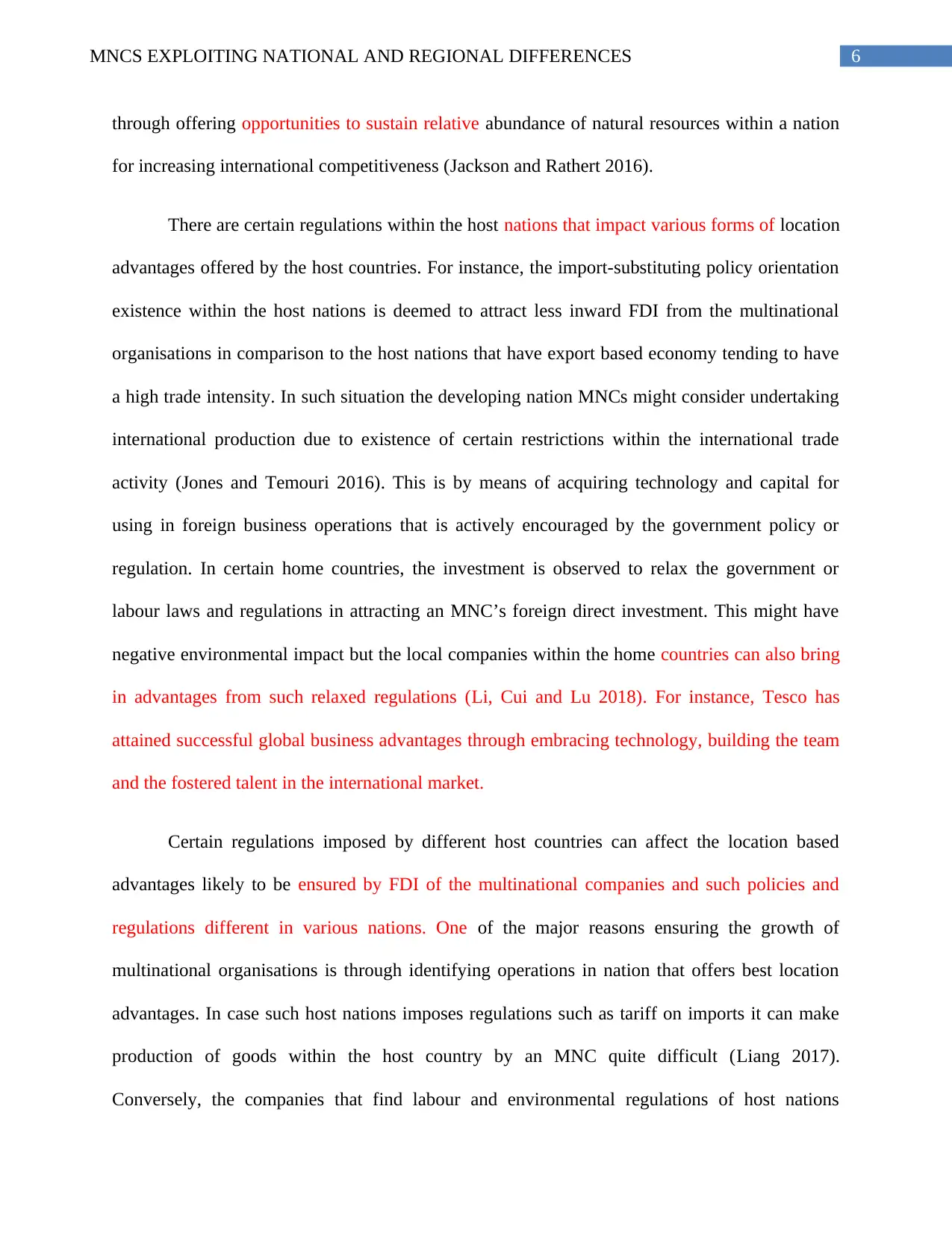
6MNCS EXPLOITING NATIONAL AND REGIONAL DIFFERENCES
through offering opportunities to sustain relative abundance of natural resources within a nation
for increasing international competitiveness (Jackson and Rathert 2016).
There are certain regulations within the host nations that impact various forms of location
advantages offered by the host countries. For instance, the import-substituting policy orientation
existence within the host nations is deemed to attract less inward FDI from the multinational
organisations in comparison to the host nations that have export based economy tending to have
a high trade intensity. In such situation the developing nation MNCs might consider undertaking
international production due to existence of certain restrictions within the international trade
activity (Jones and Temouri 2016). This is by means of acquiring technology and capital for
using in foreign business operations that is actively encouraged by the government policy or
regulation. In certain home countries, the investment is observed to relax the government or
labour laws and regulations in attracting an MNC’s foreign direct investment. This might have
negative environmental impact but the local companies within the home countries can also bring
in advantages from such relaxed regulations (Li, Cui and Lu 2018). For instance, Tesco has
attained successful global business advantages through embracing technology, building the team
and the fostered talent in the international market.
Certain regulations imposed by different host countries can affect the location based
advantages likely to be ensured by FDI of the multinational companies and such policies and
regulations different in various nations. One of the major reasons ensuring the growth of
multinational organisations is through identifying operations in nation that offers best location
advantages. In case such host nations imposes regulations such as tariff on imports it can make
production of goods within the host country by an MNC quite difficult (Liang 2017).
Conversely, the companies that find labour and environmental regulations of host nations
through offering opportunities to sustain relative abundance of natural resources within a nation
for increasing international competitiveness (Jackson and Rathert 2016).
There are certain regulations within the host nations that impact various forms of location
advantages offered by the host countries. For instance, the import-substituting policy orientation
existence within the host nations is deemed to attract less inward FDI from the multinational
organisations in comparison to the host nations that have export based economy tending to have
a high trade intensity. In such situation the developing nation MNCs might consider undertaking
international production due to existence of certain restrictions within the international trade
activity (Jones and Temouri 2016). This is by means of acquiring technology and capital for
using in foreign business operations that is actively encouraged by the government policy or
regulation. In certain home countries, the investment is observed to relax the government or
labour laws and regulations in attracting an MNC’s foreign direct investment. This might have
negative environmental impact but the local companies within the home countries can also bring
in advantages from such relaxed regulations (Li, Cui and Lu 2018). For instance, Tesco has
attained successful global business advantages through embracing technology, building the team
and the fostered talent in the international market.
Certain regulations imposed by different host countries can affect the location based
advantages likely to be ensured by FDI of the multinational companies and such policies and
regulations different in various nations. One of the major reasons ensuring the growth of
multinational organisations is through identifying operations in nation that offers best location
advantages. In case such host nations imposes regulations such as tariff on imports it can make
production of goods within the host country by an MNC quite difficult (Liang 2017).
Conversely, the companies that find labour and environmental regulations of host nations
Paraphrase This Document
Need a fresh take? Get an instant paraphrase of this document with our AI Paraphraser
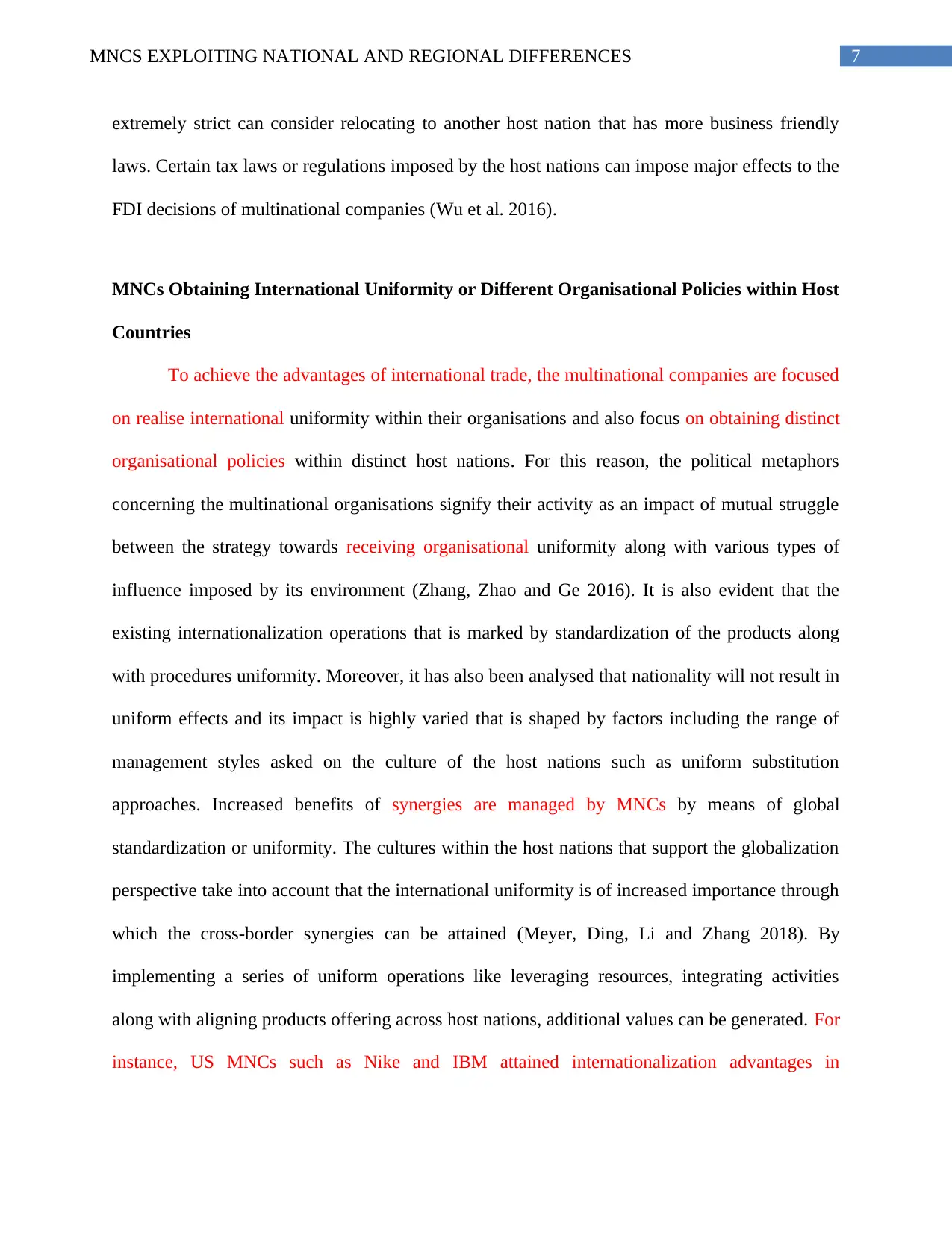
7MNCS EXPLOITING NATIONAL AND REGIONAL DIFFERENCES
extremely strict can consider relocating to another host nation that has more business friendly
laws. Certain tax laws or regulations imposed by the host nations can impose major effects to the
FDI decisions of multinational companies (Wu et al. 2016).
MNCs Obtaining International Uniformity or Different Organisational Policies within Host
Countries
To achieve the advantages of international trade, the multinational companies are focused
on realise international uniformity within their organisations and also focus on obtaining distinct
organisational policies within distinct host nations. For this reason, the political metaphors
concerning the multinational organisations signify their activity as an impact of mutual struggle
between the strategy towards receiving organisational uniformity along with various types of
influence imposed by its environment (Zhang, Zhao and Ge 2016). It is also evident that the
existing internationalization operations that is marked by standardization of the products along
with procedures uniformity. Moreover, it has also been analysed that nationality will not result in
uniform effects and its impact is highly varied that is shaped by factors including the range of
management styles asked on the culture of the host nations such as uniform substitution
approaches. Increased benefits of synergies are managed by MNCs by means of global
standardization or uniformity. The cultures within the host nations that support the globalization
perspective take into account that the international uniformity is of increased importance through
which the cross-border synergies can be attained (Meyer, Ding, Li and Zhang 2018). By
implementing a series of uniform operations like leveraging resources, integrating activities
along with aligning products offering across host nations, additional values can be generated. For
instance, US MNCs such as Nike and IBM attained internationalization advantages in
extremely strict can consider relocating to another host nation that has more business friendly
laws. Certain tax laws or regulations imposed by the host nations can impose major effects to the
FDI decisions of multinational companies (Wu et al. 2016).
MNCs Obtaining International Uniformity or Different Organisational Policies within Host
Countries
To achieve the advantages of international trade, the multinational companies are focused
on realise international uniformity within their organisations and also focus on obtaining distinct
organisational policies within distinct host nations. For this reason, the political metaphors
concerning the multinational organisations signify their activity as an impact of mutual struggle
between the strategy towards receiving organisational uniformity along with various types of
influence imposed by its environment (Zhang, Zhao and Ge 2016). It is also evident that the
existing internationalization operations that is marked by standardization of the products along
with procedures uniformity. Moreover, it has also been analysed that nationality will not result in
uniform effects and its impact is highly varied that is shaped by factors including the range of
management styles asked on the culture of the host nations such as uniform substitution
approaches. Increased benefits of synergies are managed by MNCs by means of global
standardization or uniformity. The cultures within the host nations that support the globalization
perspective take into account that the international uniformity is of increased importance through
which the cross-border synergies can be attained (Meyer, Ding, Li and Zhang 2018). By
implementing a series of uniform operations like leveraging resources, integrating activities
along with aligning products offering across host nations, additional values can be generated. For
instance, US MNCs such as Nike and IBM attained internationalization advantages in
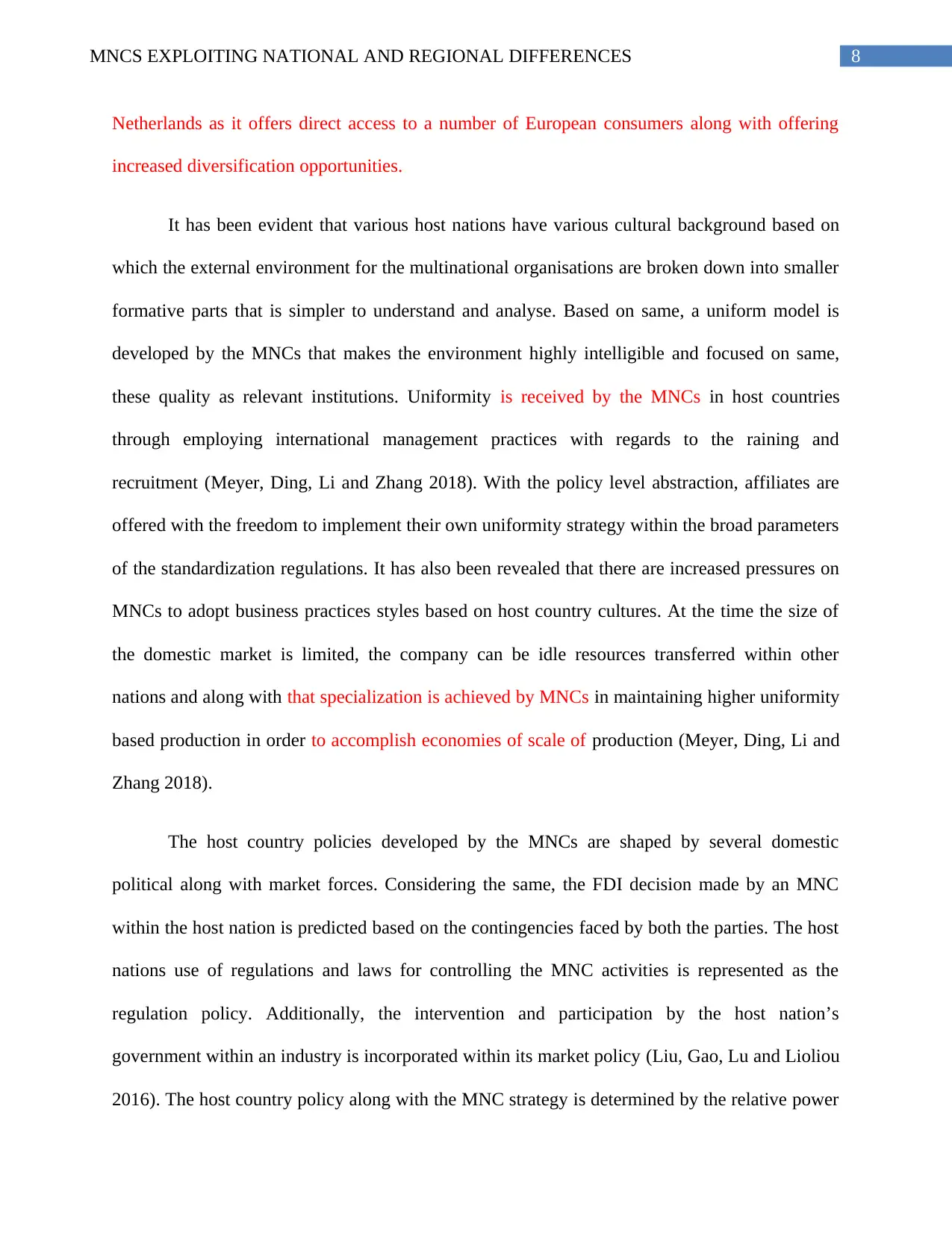
8MNCS EXPLOITING NATIONAL AND REGIONAL DIFFERENCES
Netherlands as it offers direct access to a number of European consumers along with offering
increased diversification opportunities.
It has been evident that various host nations have various cultural background based on
which the external environment for the multinational organisations are broken down into smaller
formative parts that is simpler to understand and analyse. Based on same, a uniform model is
developed by the MNCs that makes the environment highly intelligible and focused on same,
these quality as relevant institutions. Uniformity is received by the MNCs in host countries
through employing international management practices with regards to the raining and
recruitment (Meyer, Ding, Li and Zhang 2018). With the policy level abstraction, affiliates are
offered with the freedom to implement their own uniformity strategy within the broad parameters
of the standardization regulations. It has also been revealed that there are increased pressures on
MNCs to adopt business practices styles based on host country cultures. At the time the size of
the domestic market is limited, the company can be idle resources transferred within other
nations and along with that specialization is achieved by MNCs in maintaining higher uniformity
based production in order to accomplish economies of scale of production (Meyer, Ding, Li and
Zhang 2018).
The host country policies developed by the MNCs are shaped by several domestic
political along with market forces. Considering the same, the FDI decision made by an MNC
within the host nation is predicted based on the contingencies faced by both the parties. The host
nations use of regulations and laws for controlling the MNC activities is represented as the
regulation policy. Additionally, the intervention and participation by the host nation’s
government within an industry is incorporated within its market policy (Liu, Gao, Lu and Lioliou
2016). The host country policy along with the MNC strategy is determined by the relative power
Netherlands as it offers direct access to a number of European consumers along with offering
increased diversification opportunities.
It has been evident that various host nations have various cultural background based on
which the external environment for the multinational organisations are broken down into smaller
formative parts that is simpler to understand and analyse. Based on same, a uniform model is
developed by the MNCs that makes the environment highly intelligible and focused on same,
these quality as relevant institutions. Uniformity is received by the MNCs in host countries
through employing international management practices with regards to the raining and
recruitment (Meyer, Ding, Li and Zhang 2018). With the policy level abstraction, affiliates are
offered with the freedom to implement their own uniformity strategy within the broad parameters
of the standardization regulations. It has also been revealed that there are increased pressures on
MNCs to adopt business practices styles based on host country cultures. At the time the size of
the domestic market is limited, the company can be idle resources transferred within other
nations and along with that specialization is achieved by MNCs in maintaining higher uniformity
based production in order to accomplish economies of scale of production (Meyer, Ding, Li and
Zhang 2018).
The host country policies developed by the MNCs are shaped by several domestic
political along with market forces. Considering the same, the FDI decision made by an MNC
within the host nation is predicted based on the contingencies faced by both the parties. The host
nations use of regulations and laws for controlling the MNC activities is represented as the
regulation policy. Additionally, the intervention and participation by the host nation’s
government within an industry is incorporated within its market policy (Liu, Gao, Lu and Lioliou
2016). The host country policy along with the MNC strategy is determined by the relative power
⊘ This is a preview!⊘
Do you want full access?
Subscribe today to unlock all pages.

Trusted by 1+ million students worldwide
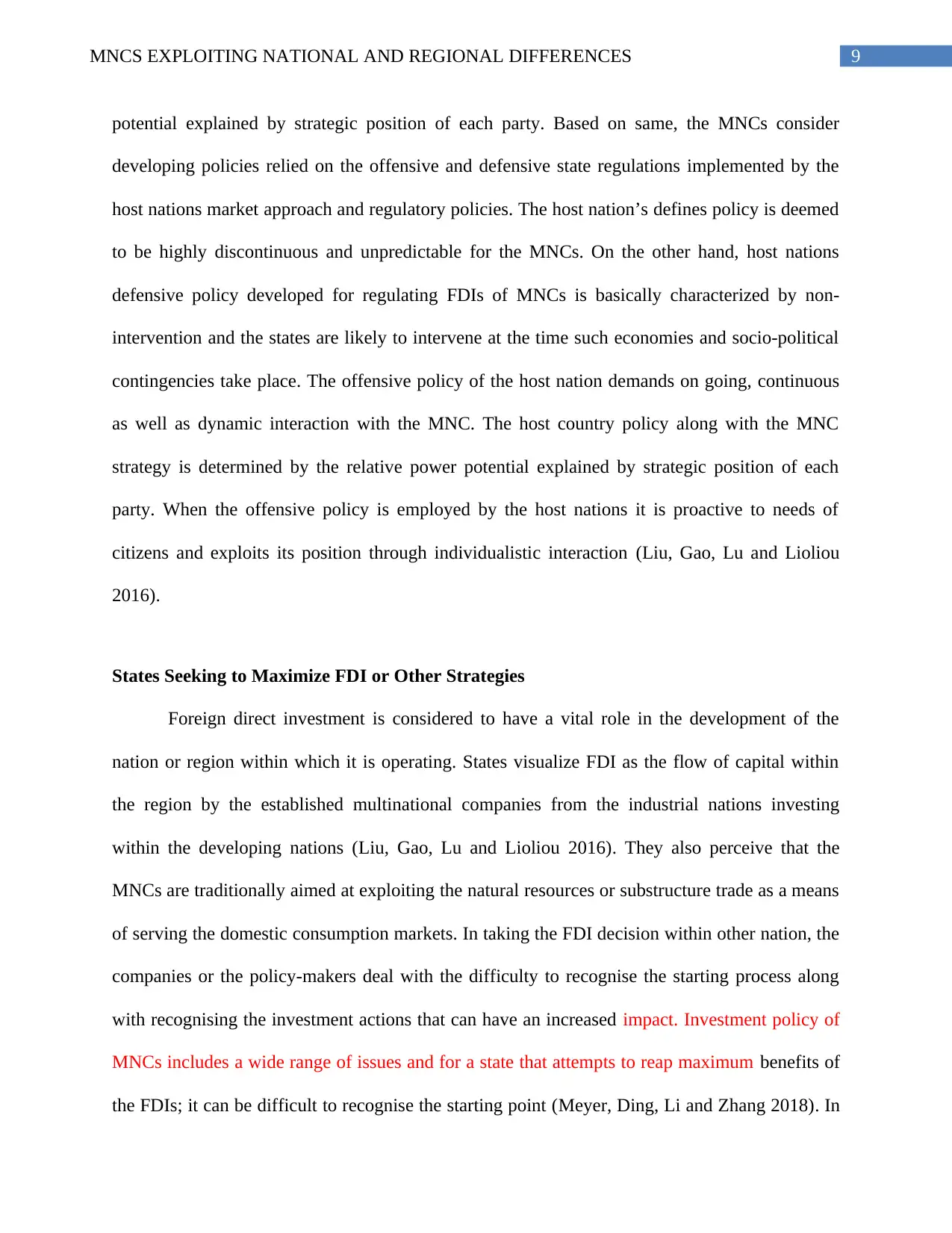
9MNCS EXPLOITING NATIONAL AND REGIONAL DIFFERENCES
potential explained by strategic position of each party. Based on same, the MNCs consider
developing policies relied on the offensive and defensive state regulations implemented by the
host nations market approach and regulatory policies. The host nation’s defines policy is deemed
to be highly discontinuous and unpredictable for the MNCs. On the other hand, host nations
defensive policy developed for regulating FDIs of MNCs is basically characterized by non-
intervention and the states are likely to intervene at the time such economies and socio-political
contingencies take place. The offensive policy of the host nation demands on going, continuous
as well as dynamic interaction with the MNC. The host country policy along with the MNC
strategy is determined by the relative power potential explained by strategic position of each
party. When the offensive policy is employed by the host nations it is proactive to needs of
citizens and exploits its position through individualistic interaction (Liu, Gao, Lu and Lioliou
2016).
States Seeking to Maximize FDI or Other Strategies
Foreign direct investment is considered to have a vital role in the development of the
nation or region within which it is operating. States visualize FDI as the flow of capital within
the region by the established multinational companies from the industrial nations investing
within the developing nations (Liu, Gao, Lu and Lioliou 2016). They also perceive that the
MNCs are traditionally aimed at exploiting the natural resources or substructure trade as a means
of serving the domestic consumption markets. In taking the FDI decision within other nation, the
companies or the policy-makers deal with the difficulty to recognise the starting process along
with recognising the investment actions that can have an increased impact. Investment policy of
MNCs includes a wide range of issues and for a state that attempts to reap maximum benefits of
the FDIs; it can be difficult to recognise the starting point (Meyer, Ding, Li and Zhang 2018). In
potential explained by strategic position of each party. Based on same, the MNCs consider
developing policies relied on the offensive and defensive state regulations implemented by the
host nations market approach and regulatory policies. The host nation’s defines policy is deemed
to be highly discontinuous and unpredictable for the MNCs. On the other hand, host nations
defensive policy developed for regulating FDIs of MNCs is basically characterized by non-
intervention and the states are likely to intervene at the time such economies and socio-political
contingencies take place. The offensive policy of the host nation demands on going, continuous
as well as dynamic interaction with the MNC. The host country policy along with the MNC
strategy is determined by the relative power potential explained by strategic position of each
party. When the offensive policy is employed by the host nations it is proactive to needs of
citizens and exploits its position through individualistic interaction (Liu, Gao, Lu and Lioliou
2016).
States Seeking to Maximize FDI or Other Strategies
Foreign direct investment is considered to have a vital role in the development of the
nation or region within which it is operating. States visualize FDI as the flow of capital within
the region by the established multinational companies from the industrial nations investing
within the developing nations (Liu, Gao, Lu and Lioliou 2016). They also perceive that the
MNCs are traditionally aimed at exploiting the natural resources or substructure trade as a means
of serving the domestic consumption markets. In taking the FDI decision within other nation, the
companies or the policy-makers deal with the difficulty to recognise the starting process along
with recognising the investment actions that can have an increased impact. Investment policy of
MNCs includes a wide range of issues and for a state that attempts to reap maximum benefits of
the FDIs; it can be difficult to recognise the starting point (Meyer, Ding, Li and Zhang 2018). In
Paraphrase This Document
Need a fresh take? Get an instant paraphrase of this document with our AI Paraphraser
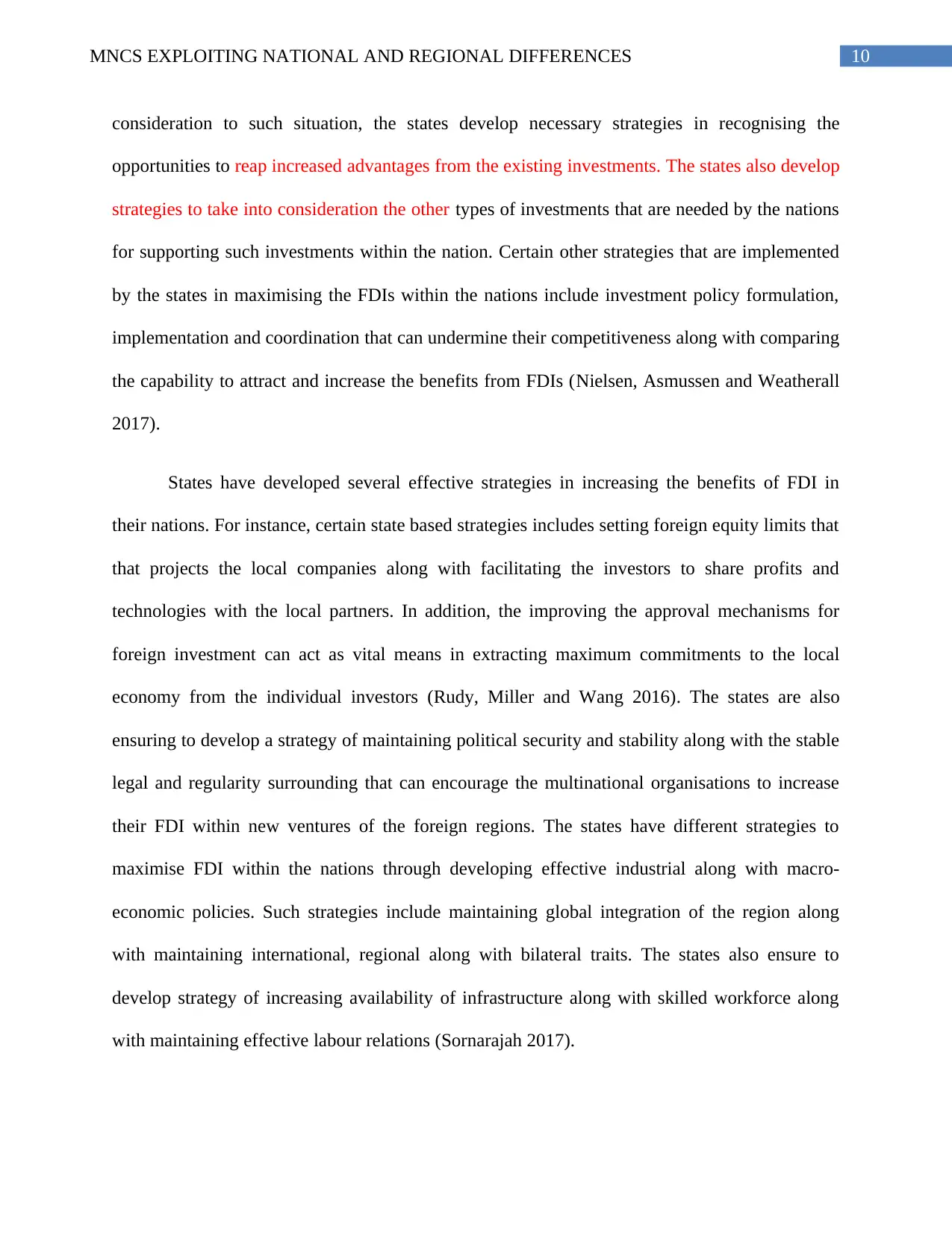
10MNCS EXPLOITING NATIONAL AND REGIONAL DIFFERENCES
consideration to such situation, the states develop necessary strategies in recognising the
opportunities to reap increased advantages from the existing investments. The states also develop
strategies to take into consideration the other types of investments that are needed by the nations
for supporting such investments within the nation. Certain other strategies that are implemented
by the states in maximising the FDIs within the nations include investment policy formulation,
implementation and coordination that can undermine their competitiveness along with comparing
the capability to attract and increase the benefits from FDIs (Nielsen, Asmussen and Weatherall
2017).
States have developed several effective strategies in increasing the benefits of FDI in
their nations. For instance, certain state based strategies includes setting foreign equity limits that
that projects the local companies along with facilitating the investors to share profits and
technologies with the local partners. In addition, the improving the approval mechanisms for
foreign investment can act as vital means in extracting maximum commitments to the local
economy from the individual investors (Rudy, Miller and Wang 2016). The states are also
ensuring to develop a strategy of maintaining political security and stability along with the stable
legal and regularity surrounding that can encourage the multinational organisations to increase
their FDI within new ventures of the foreign regions. The states have different strategies to
maximise FDI within the nations through developing effective industrial along with macro-
economic policies. Such strategies include maintaining global integration of the region along
with maintaining international, regional along with bilateral traits. The states also ensure to
develop strategy of increasing availability of infrastructure along with skilled workforce along
with maintaining effective labour relations (Sornarajah 2017).
consideration to such situation, the states develop necessary strategies in recognising the
opportunities to reap increased advantages from the existing investments. The states also develop
strategies to take into consideration the other types of investments that are needed by the nations
for supporting such investments within the nation. Certain other strategies that are implemented
by the states in maximising the FDIs within the nations include investment policy formulation,
implementation and coordination that can undermine their competitiveness along with comparing
the capability to attract and increase the benefits from FDIs (Nielsen, Asmussen and Weatherall
2017).
States have developed several effective strategies in increasing the benefits of FDI in
their nations. For instance, certain state based strategies includes setting foreign equity limits that
that projects the local companies along with facilitating the investors to share profits and
technologies with the local partners. In addition, the improving the approval mechanisms for
foreign investment can act as vital means in extracting maximum commitments to the local
economy from the individual investors (Rudy, Miller and Wang 2016). The states are also
ensuring to develop a strategy of maintaining political security and stability along with the stable
legal and regularity surrounding that can encourage the multinational organisations to increase
their FDI within new ventures of the foreign regions. The states have different strategies to
maximise FDI within the nations through developing effective industrial along with macro-
economic policies. Such strategies include maintaining global integration of the region along
with maintaining international, regional along with bilateral traits. The states also ensure to
develop strategy of increasing availability of infrastructure along with skilled workforce along
with maintaining effective labour relations (Sornarajah 2017).
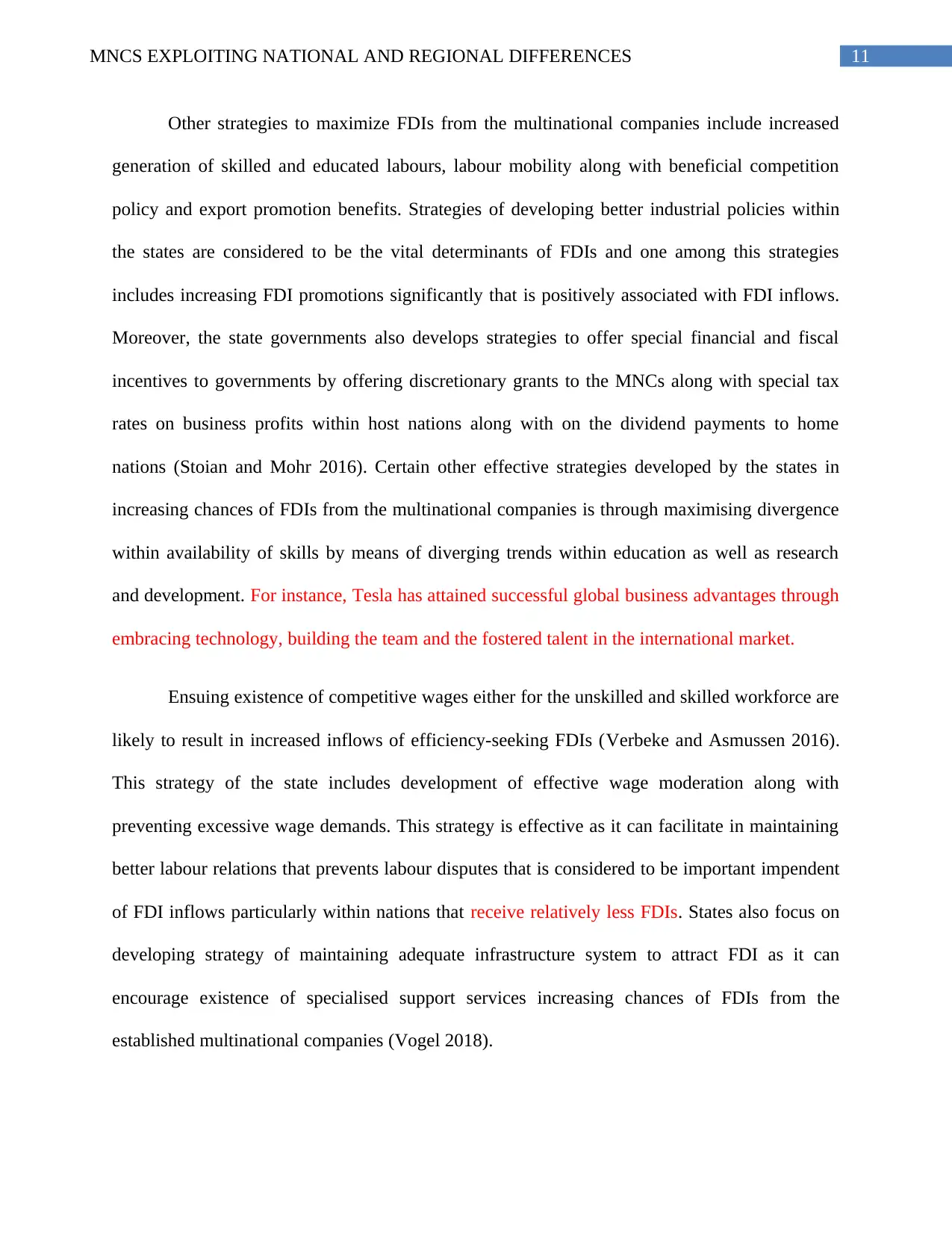
11MNCS EXPLOITING NATIONAL AND REGIONAL DIFFERENCES
Other strategies to maximize FDIs from the multinational companies include increased
generation of skilled and educated labours, labour mobility along with beneficial competition
policy and export promotion benefits. Strategies of developing better industrial policies within
the states are considered to be the vital determinants of FDIs and one among this strategies
includes increasing FDI promotions significantly that is positively associated with FDI inflows.
Moreover, the state governments also develops strategies to offer special financial and fiscal
incentives to governments by offering discretionary grants to the MNCs along with special tax
rates on business profits within host nations along with on the dividend payments to home
nations (Stoian and Mohr 2016). Certain other effective strategies developed by the states in
increasing chances of FDIs from the multinational companies is through maximising divergence
within availability of skills by means of diverging trends within education as well as research
and development. For instance, Tesla has attained successful global business advantages through
embracing technology, building the team and the fostered talent in the international market.
Ensuing existence of competitive wages either for the unskilled and skilled workforce are
likely to result in increased inflows of efficiency-seeking FDIs (Verbeke and Asmussen 2016).
This strategy of the state includes development of effective wage moderation along with
preventing excessive wage demands. This strategy is effective as it can facilitate in maintaining
better labour relations that prevents labour disputes that is considered to be important impendent
of FDI inflows particularly within nations that receive relatively less FDIs. States also focus on
developing strategy of maintaining adequate infrastructure system to attract FDI as it can
encourage existence of specialised support services increasing chances of FDIs from the
established multinational companies (Vogel 2018).
Other strategies to maximize FDIs from the multinational companies include increased
generation of skilled and educated labours, labour mobility along with beneficial competition
policy and export promotion benefits. Strategies of developing better industrial policies within
the states are considered to be the vital determinants of FDIs and one among this strategies
includes increasing FDI promotions significantly that is positively associated with FDI inflows.
Moreover, the state governments also develops strategies to offer special financial and fiscal
incentives to governments by offering discretionary grants to the MNCs along with special tax
rates on business profits within host nations along with on the dividend payments to home
nations (Stoian and Mohr 2016). Certain other effective strategies developed by the states in
increasing chances of FDIs from the multinational companies is through maximising divergence
within availability of skills by means of diverging trends within education as well as research
and development. For instance, Tesla has attained successful global business advantages through
embracing technology, building the team and the fostered talent in the international market.
Ensuing existence of competitive wages either for the unskilled and skilled workforce are
likely to result in increased inflows of efficiency-seeking FDIs (Verbeke and Asmussen 2016).
This strategy of the state includes development of effective wage moderation along with
preventing excessive wage demands. This strategy is effective as it can facilitate in maintaining
better labour relations that prevents labour disputes that is considered to be important impendent
of FDI inflows particularly within nations that receive relatively less FDIs. States also focus on
developing strategy of maintaining adequate infrastructure system to attract FDI as it can
encourage existence of specialised support services increasing chances of FDIs from the
established multinational companies (Vogel 2018).
⊘ This is a preview!⊘
Do you want full access?
Subscribe today to unlock all pages.

Trusted by 1+ million students worldwide
1 out of 16
Related Documents
Your All-in-One AI-Powered Toolkit for Academic Success.
+13062052269
info@desklib.com
Available 24*7 on WhatsApp / Email
![[object Object]](/_next/static/media/star-bottom.7253800d.svg)
Unlock your academic potential
Copyright © 2020–2026 A2Z Services. All Rights Reserved. Developed and managed by ZUCOL.





